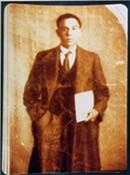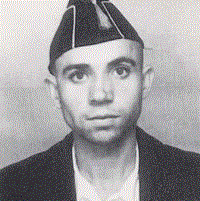Miguel Hernandez was born in Orihuela, Spain, in 1910. His father raised and herded cattle and his mother cared for their family and home. Due to his family’s economic situation, Hernandez was not able to attend much schooling. Rather, he was needed to help his father in the fields. During his short time at school however, he developed interest in reading and studying. Even after leaving school to work in the field with his father, he continued reading and became a frequent visitor at the library. Here he discovered many classical Spanish authors, who became an inspiration to him.
 |
| Miguel Hernández (http://www.miguelhernandezvirtual.com /vida/vida.htm) |
In 1925 he wrote his first series of poems. His inspiration for these poems came from his surroundings. Many of these poems were about the mountains, rivers and animals he saw while working. In 1931 Hernandez traveled to Madrid, but did not find the support he had hoped to find, so he decided to come back to Orihuela. There he published his first book, "Perito en Lunas" (Expert on Moons). In 1934 he returns to Madrid, this time finding his trip to be much more successful. Here he published Cruz y Raya. He also began to develop relationships with other important poets. In 1936 he published Elegía and a book of poems titled "El rayo que no cesa" (The Ray That Does Not Cease).
 |
| During the Spanish Civil War (http://www.miguelhernandezvirtual.com /vida/vida.htm) |
Also in 1936, Hernandez joined the Ejército Popular de la República, or the Popular Army of the Republic as the Cultural Commissioner. The Popular Front, or Popular Army, was dedicated to fighting fascism during the Spanish Civil War. In 1938, his first son dies. As a result of his experiences with the war and the death of his son, his writing begins to change and speaks of both tragedy and hope. In 1930 Franco wins and defeats the Popular Army. Hernandez decides to flee to Portugal, but is caught and put into prison. During his time in prison he continued to write, and actually wrote some of his most famous pieces such as "Nanas de la cebolla" (Onion Lullaby). This is a poem, which he wrote in response to a letter from his wife informing him that her and his second son were living off onions. It depicts a woman nursing a boy with onions. This is a tragic scene, but he allows the boy's laughter to brighten the poem. Hernandez spent the rest of his life traveling from one prison to another and eventually died of tuberculosis in the prison infirmary. Both his work and his life story have left a lasting impression on the world, especially the Spanish community. During his last few years he not only communicated the tragedy he saw and experienced in his poems, but he also wrote of hope he saw and lived a life working to cause a change in what he saw to be a broken country.
Sources Consulted:
La Vida Del Poeta. Retrieved October 8, 2007 from http://www.miguelhernandezvirtual.com/vida/vida.htm.
Wikipedia. Miguel Hernández. Retrieved October 8, 2007 from http://en.wikipedia.org/wiki/Miguel_Hernandez.
Page created on 10/12/2007 12:00:00 AM
Last edited 10/12/2007 12:00:00 AM
